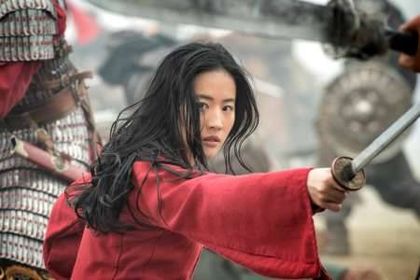Why the calls to boycott ‘Mulan’ are a good thing
Disney’s new live-action version of Mulan has just been released on streaming, and it’s been met with hostility. The hashtags #BoycottMulan and #BanMulan began trending on Twitter after Disney gave “special thanks” to authorities in the Xinjiang region, where over a million Uyghur Muslims have been forced into re-education camps. That the House of Mouse is seemingly willing to turn a blind eye to a campaign of genocide in order to attract Chinese box office is genuinely horrifying, and that’s why anyone seriously concerned about what is happening ought to consider boycotting Mulan.
There was a time when the most controversial things about this reboot were the lack of Li Shang and Mushu (the former dropped because of #MeToo optics, which attracted some criticism too). Last summer, the film’s star Liu Yifei made some comments showing her support for police forces in Hong Kong. At the time, Hong Kong was erupting in a series of pro-democracy protests, but Liu instead took the side of the police who were cracking down on their freedom – on Weibo, she wrote: “I support Hong Kong’s police, you can beat me up now.”
The #BoycottMulan first trended then, with prominent Hong Kong activist Joshua Wong later tweeting: “This film is released today. But because Disney kowtows to Beijing, and because Liu Yifei openly and proudly endorses police brutality in Hong Kong, I urge everyone who believes in human rights to #BoycottMulan.” For the company, though, it’s an easy decision – China has 1.3 billion people, Hong Kong has less than 10 million, so the box office is obvious.
In order to stamp out Turkic minorities and the Islamic faith in Xinjiang, more than a million people have been driven into gulags, mass surveilled, sterilised and forced to abort their children
After the film’s release, the PR situation for Disney got worse. Social media users were quick to point out that Disney thanks the Chinese Communist Party’s (CCP) publicity department in Xinjiang, as well as agencies in the city of Turpan. One such body thanked is the Turpan Security Bureau, which is complicit in a mass-detention campaign in the region. In order to stamp out Turkic minorities and the Islamic faith in Xinjiang, more than a million people have been driven into gulags, mass surveilled, sterilised and forced to abort their children – by any legal and ethical standard, this is attempted genocide. The publicity department is responsible for diffusing propaganda to convince outsiders that this simply isn’t happening. Disney lists both of these entities as partners, entities that are “facilitating crimes against humanity”.
Now, as Mulan was shot in the region, it’s frankly unbelievable that Disney wouldn’t have known what was happening. Indeed, it’s possible those working on the film might even have seen the camps – on Twitter, Shawn Zhang notes that if the crew took “highway G312 to Shanshan desert where they filmed, they could see at least 7 re-education camps”. That Disney looked at the trade-off – making a stand for human rights or earning a chunk of Chinese money – and chose the latter is a horrendous thing. Amnesty International even tweeted a link asking Disney: “Can you show us your human rights due diligence report?”
It has previously chosen the side of the Chinese before – last autumn, then-CEO Bob Iger said that the pro-democracy movement is not “something we should engage with in a public manner” because it might harm the company, and it defended Liu’s comments as freedom of speech. But the company is not apolitical, not by any means – it publicly came out against the state of Georgia when it looked to introduce a strict abortion bill. They’re not motivated by ethics or decency, but where the money lies. Alan Horn, co-chairman of The Walt Disney Studios, said that “if Mulan doesn’t work in China, we have a problem” – with that in mind, the company is willing to ignore human rights abuses if people will watch its films.
Pro-democracy activists in Hong Kong have reignited calls to boycott the film, and they are now joined by activists in Thailand and Taiwan
Pro-democracy activists in Hong Kong have reignited calls to boycott the film, and they are now joined by activists in Thailand and Taiwan, in large part due to the #MilkTeaAlliance – this is an online movement uniting pro-democracy figures with concerns about China’s influence in the region. Student activist Netiwit Chotiphatphaisal tweeted: “I invite everyone to #boycottMulan #banMulan to make Disney and the Chinese government know that state violence against the people is unacceptable.” Joshua Wong tweeted: “Now, when you watch #Mulan, not only are you turning a blind eye to police brutality and racial injustice… you’re also potentially complicit in the mass incarceration of Muslim Uyghurs.”
Since Mulan’s release, Disney’s reputation has taken a deserved hit – a company with a back catalogue of films about respecting others and doing the right thing has turned its back on principles in favour of money. And a boycott is sadly the only correct response to this – Disney won’t change its relationship to an oppressive government because it’s the right thing to do, but hitting them in the pocket might make them reconsider. It has rarely been more important to vote with your wallet and refuse to endorse Disney in this decision. Mulan is now more than a film – it has become a symbol of oppression and suppression, and we have a moral duty not to pay and support that.

Comments